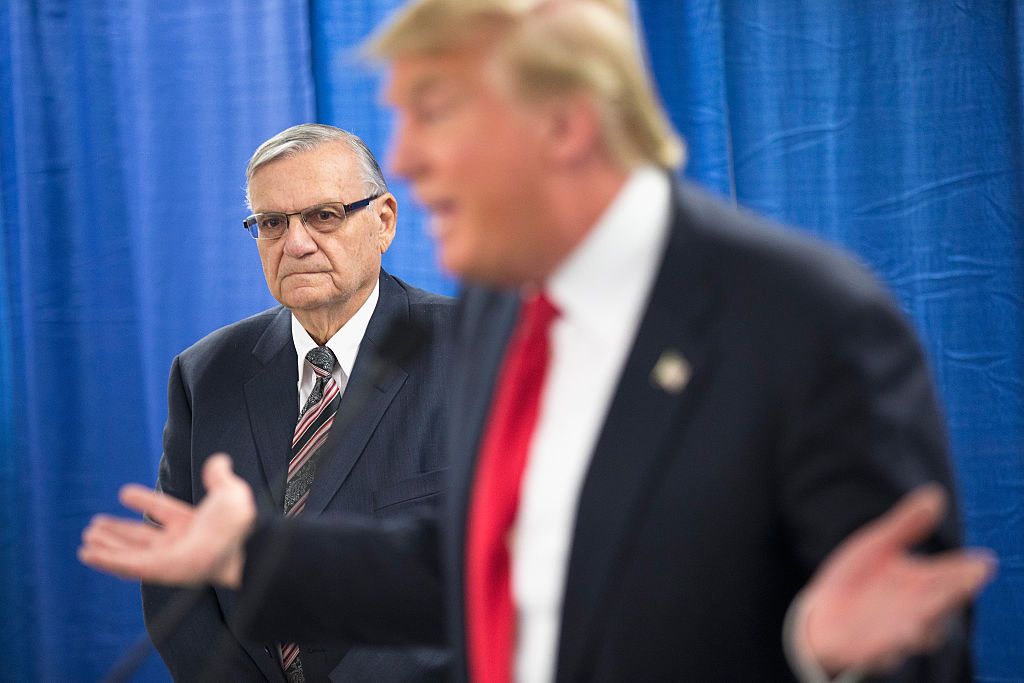
Sheriff Joe Arpaio of Maricopa County, Arizona, listens as Republican presidential candidate Donald Trump speaks to the press prior to a rally on Jan. 26, 2016, in Marshalltown, Iowa. (Photo by Scott Olson/Getty Images)
This post originally appeared at Hullabaloo.
The fallout from the president’s pardon of Joe Arpaio is as thick as it is toxic. Almost as heavy as the rains from Hurricane Harvey. Whether either will do sufficient damage to our “child king” (as one Republican member of Congress described the president) to limit further damage to the fabric of the nation is still to be determined.
To issue a pardon for Arpaio would be “an assault on the federal judiciary, the Constitution and the rule of law itself,” Noah Feldman, a constitutional and international law professor at Harvard University, wrote for Bloomberg before the pardon announcement:
It’s one thing to pardon a criminal out of a sense of mercy or on the belief that he has paid his debt to society.
It’s trickier when the president pardons someone who violated the law in pursuit of governmental policy, the way George H.W. Bush pardoned Iran-Contra participants, including Caspar Weinberger and five others.
But it would be an altogether different matter if Trump pardoned Arpaio for willfully refusing to follow the Constitution and violating the rights of people inside the US.
Impeachment is the only constitutional remedy for dealing with a president, writes Feldman, “who abuses the pardon power to break the system itself.”
The Washington Post collected a few more reactions:
New York magazine called it “Donald Trump’s gravest abuse of power yet.” An op-ed contributor for The New York Times said that Trump’s decision put him in “uncharted waters,” writing, “If the president can employ the pardon power to circumvent constitutional protections of liberty, there is very little left of the constitutional checks on presidential power.” Bob Bauer, a former White House counsel in the Obama administration, suggested on Lawfare that the decision showed a clear disregard for the rule of law.
Frank Bowman, a professor at the University of Missouri School of Law, gives several reasons why the Arpaio pardon is the president’s first verifiable impeachable offense:
- It is an impeachable offense precisely because it involves the exercise of a constitutionally created presidential power.
- The use of the pardon power in this case is a direct assault on core constitutional rights, statutory civil rights laws of the United States, and the authority of courts to enforce those laws.
- It therefore threatens constitutional civil liberties generally, as well as the viability of congressionally authorized statutory law, and it is a direct attack on the constitutional powers of the judiciary as a coordinate branch of government.
- Accordingly, this pardon threatens to undercut one of the indispensable, foundational norms of American constitutional order: the rule of law.
- Recall: Republicans impeached Bill Clinton for lawyerly dissembling/lying under oath about a sexual affair. (I can still hear Rep. Sue Myrick (R-NC) saying “the children are watching” during the Clinton impeachment.)
The question, of course, is whether Republicans who got so exercised about the example set by a Democratic president can muster similar outrage when the president is one of their own. That shouldn’t be so hard, argues Peter Wehner, senior fellow at the Ethics and Public Policy Center:
Much of this mess is of the Republican Party’s own making. Let’s not forget that Mr. Trump’s political rise began with his promulgation of the racist conspiracy theory that President Obama was not a natural-born American citizen. The Trump presidency is the result of years of destructive mental habits and moral decay.
But before we examine Wehner’s analysis further, consider that the president is a piker compared to the founder of the Republican Feast of Resentment. That honor goes to Richard Nixon, writes Jeff Shesol at The New Yorker:
During the 1968 campaign, Kevin Phillips, then a young Nixon aide, said to Garry Wills that “the whole secret of politics” was “knowing who hates who.”
Our sitting president knows that. Nixon knew it first. The sitting president birthed “birtherism.” Nixon birthed Nixonism:
— Peter Wehner, senior fellow at the Ethics and Public Policy Center
There is a temptation to locate Nixon’s politics deep in his psyche — that wellspring of loathing, humiliation, and lonely desperation, in the diagnosis of biographers, former White House aides, and co-conspirators, and the rest of what the historian David Greenberg calls “Nixon’s army of analysts.” “Can you imagine what this man would have been had somebody loved him?” Henry Kissinger famously asked. “I don’t think anybody ever did — not his parents, not his peers.” (Nor his national security advisers.) It is clear that, for Nixon, resentment was not just a cynical strategy but an authentic expression of the self. (Our 50 minutes are up, Mr. President, but I’ll see you next week.)
Yet this resort to psychology, or psychopathology, places too much emphasis on Nixon and not enough on Nixonism, which has endured well beyond Watergate, and long past the point when our national nightmare, to paraphrase Gerald Ford, was supposed to have ended. The resentments, racial and cultural and economic, are still real, if not nearly as raw as in 1968, and invoking them has become a kind of reflex on the right, to the point of self-parody. Agnew’s “effete corps of impudent snobs” begets George Bush’s “Harvard boutique liberals” begets Rick Santorum’s attack on President Obama as a “snob” for urging all kids to go to college. “I don’t come from the élite,” Santorum said in 2012. “Élites come up with phony ideologies and phony ideas to rob you of your freedom.” More recently, Ted Cruz attacked President Obama for “doing a lot of pop culture” and acting with “condescension” toward young Americans. It is Nixon pastiche.
The sitting president, bearing the scars of his own loveless childhood, is simply better prepared to do Nixon than his modern imitators. And just as prepared as both Nixon and Arpaio to become a law unto himself. The question at hand is whether Republicans are prepared to stop him as Nixon was stopped. Do they have the fortitude left to oppose the “moral ugliness” that Nixon sowed, they themselves watered, and the current president harvested? Wehner continues:
They need to accept, finally, the reality — evident from the moment he declared his candidacy — that Mr. Trump is unfit to govern. He will prove unable to salvage his presidency. As the failures pile up, he’ll act in an even more erratic fashion.
The mental hurdle Republicans have to clear is that in important respects the interests of the Republican Party and those of Donald Trump no longer align. The party has to highlight ways in which it can separate itself from the president.
It is not clear they have the right stuff. Yet all is not lost. America is more resilient than we realize.
Nicholas Kristof likens the president to the Rome’s Caligula, a man with “no significant government experience” who proved himself “utterly incompetent at actually getting things done.” Besides that, “a narcissist and megalomaniac,” and a coward with “a thing for generals.”
But Rome survived Caligula, and so might we our own, Kristof suggests:
To me, the lesson is that Rome was able to inoculate itself against unstable rulers so that it could recover and rise to new glories. Even the greatest of nations may suffer a catastrophic leader, but the nation can survive the test and protect its resilience — if the public stays true to its values, institutions and traditions. That was true two millennia ago, and remains true today.
Never more than this morning, I hope he is right.




